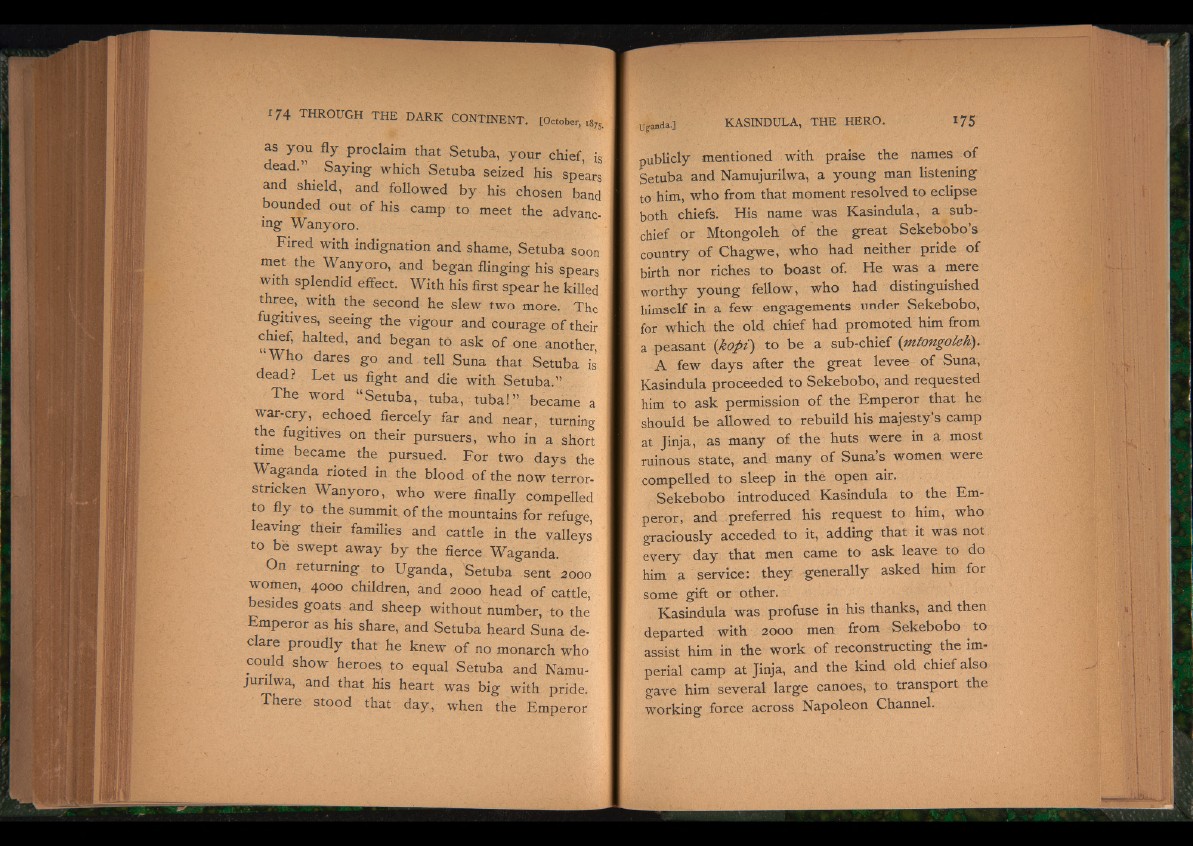
as yo u fly proclaim that Setuba, your chief, is
dead. Saying which Setuba seized his spears
and shield, and followed b y his chosen band
bounded out o f his camp to meet the advanc
ing Wanyoro. ^ :
Fired with indignation and shame, Setuba soon
met the Wanyoro, and began flinging his spears
with splendid effect. With his first spear he killed
three, with the second he slew two more. The
fugitives, seeing the vigour and courage o f their
chief, halted, and began to ask o f one another,
“ W h o dares g o and tell Suna that Setuba is
dead? L e t us fight and die with Setuba.”
T h e word “ Setuba, tuba, tu b a !” became a
war-cry, echoed fiercely far and near, turning
the fugitives on their pursuers, who in a short
time became the pursued. F o r two days the
Waganda rioted in the blood o f the now terror-
stricken Wanyoro, who were finally compelled
to fly to the summit o f the mountains for refuge,
leaving their families and cattle in the valleys
to be swept aw a y b y the fierce Waganda.
On returning to Uganda, Setuba sent aooo
women, 4000 children, and 2000 head o f cattle,
besides goats and sheep without number, to the
Emperor as his share, and Setuba heard Suna declare
proudly that he knew o f no monarch who
could show heroes, to equal Setuba and Namu-
jurilwa, and that his heart was big with pride.
There stood that day, when the Emperor
publicly mentioned with praise the names o f
Setuba and Namujurilwa, a young man listening
to him, who from that moment resolved to eclipse
both chiefs. His name was Kasindula, a subchief
or Mtongoleh o f the great Sekeb ob o’s
country o f Chagwe, who had neither pride o f
birth nor riches to boast of. He was a mere
worthy young fellow, who had distinguished
himself in a few engagements under Sekebobo,
for which the old chief had promoted him from
a peasant (k o p i) to be a sub-chief (mtongoleh).
A few days after the great levee o f Suna,
Kasindula proceeded to Sekebobo, and requested
him to ask permission o f the Emperor that he
should be allowed to rebuild his majesty s camp
at Jinja, as many of the huts were in a most
ruinous state, and many o f Suna’s women were
compelled to sleep in the open air.
Sekebobo introduced Kasindula to the Emperor,
and preferred his request to him, who
graciously acceded to it, adding that it was not
every day that men came to ask leave to do
him a serv ice : th e y generally asked him for
some gift or other.
Kasindula was profuse in his thanks, and then
departed with 2000 men from Sekebobo to
assist him in the w o rk o f reconstructing th« imperial
camp at Jinja, and the kind old chief also
gave him several large canoes, to transport the
working force across Napoleon Channel.